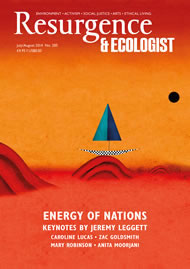With his characteristic flourish, in the March/April 2014 issue of Resurgence & Ecologist Satish Kumar championed the Festival of Wellbeing held in London last October: “We need a new movement of awareness and action to bring meaning to life and to put community wellbeing at the heart of politics. Instead of economic growth we need growth in wellbeing.”
A recent report by the Legatum Institute entitled Wellbeing and Policy, chaired by the former Cabinet Secretary Gus O’Donnell, summarises clearly the case for introducing wellbeing into all aspects of policymaking, especially social and economic policy. It is worthy of note that all too often those in positions of real influence abdicate their responsibility for the long term by pandering to the flawed short-term imperatives of their political masters, only saying the ‘right’ things once they are free from the constraints of office.
There was an interesting example of this when government-inspired tax cuts on local authorities in the late 1980s almost forced the closure of Brockwell Lido, in Lambeth. By any standards this was a public good that provided enormous wellbeing for local people. Yet only when out of office would a former Cabinet Secretary champion the reinstatement of the facility. If only he had walked the talk.
O’Donnell is frank about this in his introduction to the Legatum Institute report:
“We must never lose sight of the consequences of the same behavioural factors on the ability of governments to tackle all these issues. After all, governments are run by politicians and policies are implemented by public servants, who have their own behavioural motivations. All ministers regularly perform in front of their backbenchers. It is therefore hardly surprising that ministers tend to think of solutions that will be well received in both Houses. Quite often, this imparts a bias towards legislation as the way of solving a policy problem. Yet as a long-term tool, legislation has its disadvantages as it can be very rigid and quickly become ill-suited to the dynamic world we inhabit.”
The Legatum Panel add their well-researched voice for the establishment of a much more comprehensive measure of economic and social betterment than just GDP. They do not get quite as far as recommending the ditching of GDP, but they strongly advocate its continued marginalisation. This shift will require a set of measures emphasising social enrichment; a sense of being fairly treated; appropriate training to enhance capabilities, security and amenity in local neighbourhoods; the enhancement of family relations and community connectedness. Behind all of this are calls for much more localised democracy, much greater self-governance at the local level, with access to community-based charities for funding betterment schemes and initiatives, and a whole new approach to social justice, taking into account the longer term in all aspects of decision-making.
Research has found that these qualities of living count for more than wealth, jobs and economic performance measured on their own. The aim is to create one or more parallel measures of wellbeing to accompany the regular GDP growth reports. This aspect is aimed particularly at the prospects for a fuller measure of wellbeing, as is presently being explored by the Office for National Statistics.
What is going on here is transformational. We visualise the basis for a whole new approach to creating an equitable and just society that provides everyone with the capabilities, the confidence and the prospects for their personal flourishing as both creative individuals and responsible citizens. This is nothing short of a new social and political engagement. There is a lot more to wellbeing than just happiness.
Critically at stake is creating through these wellbeing pathways a social appreciation of a robust and renewed natural world. Arguably it is only a society of decency that is sufficiently confident truly to value natural capital and afford it the protection and renewal it deserves. Part of this journey involves more recognition of the roles of social investment and enterprise as a basis for creating secure prosperity.
Also relevant are the themes of social cohesion (or social breakdown), of equality of income and opportunity (or growing fairness divide), and of social mobility and aspiration (or stagnation and depression). Since wellbeing relates to personal security, to family and social relationships, to mental and physical health, to the quality and security of tenure of housing, and to meaningful occupation (not confined to formal jobs but extended to voluntary activity, mentoring and personal fulfilment), these aspects should be given more prominence in national and local guidelines for economic performance and effectiveness of governmental delivery.
This is particularly the case for a society that is progressively ageing and where the demands for flexible and lifetime learning for young people are likely to become overwhelming unless the coming generation is suitably prepared.
Activities that palpably enhance personal and community wellbeing, such as caring, volunteering, mentoring, offsetting antisocial behaviour and crime, avoiding mental and physical ill health, providing access to open spaces and Nature, generating leadership and responsibility in learning, and enhancing responsible citizenship, should be regarded as investment in personal and social security and be economically supported as such. We need a process of social investment that provides the basis for a social income. This would offer appropriate recognition to the various roles of personal and community betterment in creating fulfilment and enterprise. This is where the much-heated squabble over the benefits culture should be redirected towards championing a betterment culture.
Disadvantage generally (poverty, disability, low educational ability, race, migrant status, derelict neighbourhood, and feelings of marginalisation and alienation) considerably lowers wellbeing, and any policy measure likely to increase disadvantage is also likely to reduce wellbeing. Such an outcome bodes very ill for the future cohesiveness and democratic trustfulness of future British society, as well as for skills upgrades and overall productivity increases and international competitiveness. Wellbeing therefore becomes the touchstone for a possible new economy and democracy, and for a much more effective localism.
The Resurgence Festival of Wellbeing will take place on 11 October 2014 in London. www.resurgence.org/wellbeing








